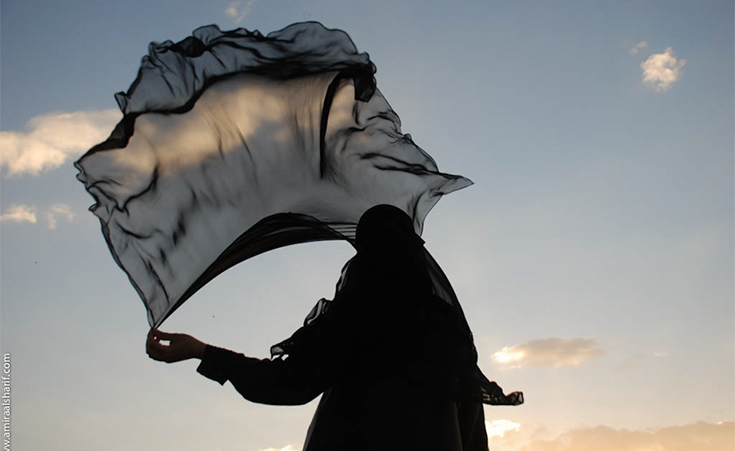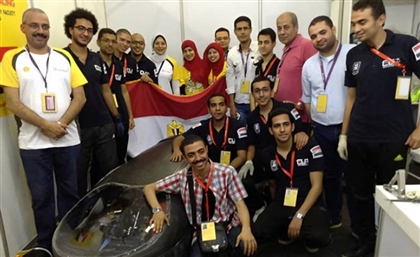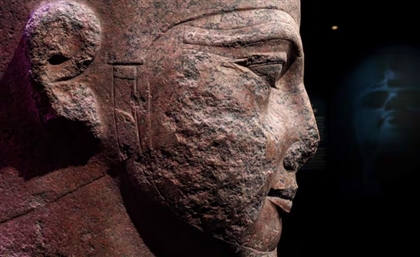On Being Muslim and Feminist
Unorthodox, independent, and intrinsically non-stereotypical, Muslim feminists challenge both Western liberal and Muslim clichés. Valentina Primo speaks to two Egyptian feminist women about religion, culture, and their refusal to be typecast into categories they do not recognise themselves.

“Feminism can be counterproductive. Look at mainstream white feminists, or as I like to call them, Tumblr feminists. They are usually privileged white women – educated, heterosexual, middle-to-upper class. They claim feminism. And they will continue to. And that’s why I don’t agree with all types of feminism, because in the process of their raucous claim of feminism, they erase the struggles of many women who actually need to have a voice,” says Malak*.
Unconventional and non-stereotypical, Muslim feminists stand on the outskirts of mainstream agendas, defying both Western liberal and Muslim preconceptions as they diligently refuse to be cast into categories that define them without their consent. While the diversity of their stance – as well as the diverse realities of women in Muslim countries - makes it impossible to paint a univocal picture of feminism in the Muslim world, it is precisely this heterogeneous nature that ascertains their independence of thought.
“I can’t define myself as a feminist. I do believe in feminism, but I refuse to label myself. I can tell you what I do and what I believe in; those are the things that define me more than a label,” says Nouran*, who works in a feminist non-profit organisation.
“Feminism incorporates so many theories, and even within each theory, you will find different 'sects' so to speak,” adds Malak,* a 26-year-old specialist in Gender Studies. Born in Sudan and raised in Egypt, she defines herself as a black feminist. “I believe and integrate black feminist thought in many aspects of my life – it is how I view the world; as a black, African woman. And the long (and often unforgotten and not written in history) struggle of black feminism is one I can relate to. Therefore, yes, I am a feminist. But I am against the bare use of the label feminist.”
Feminists are not a common sight in contexts like Egypt, where some Muslim circles perceive them as stereotypical man-hating, self-hating women who “have been brainwashed by the West into thinking that the role of a wife and mother isn't enough for her and is now just a pitiable tool of the Decadent West,” as self-proclaimed Salafi Feminist Zainab Bint Younus describes on her blog. On the other side of the spectrum, Western feminists often deem Muslim women oppressed, often falling into a widespread ethnocentric patronising stance that deprives Muslim women of their right to self-assertion.
But the way Zainab spouts her convictions is a blunt testament to her outspoken out-of-the-ordinary feminism. “I am a niqaabi who hates those ‘Da'wah pictures’ which say women are either pretty covered-up lollipops or trashed unwrapped candies being bombarded with flies… I am a happy wife and mother, and I loathe those people who try to tell me that I should only be happy in my role as a wife and mother. I believe in pursuing knowledge, Islamic and otherwise (and in fields other than gynecology or teaching kindergarten), and would really like to flip the bird at those twits still debating 'women's education in Islam.' I believe that men and women both have control over their actions and desires, and that a woman looking at a male speaker is not going to send her into a frenzy of lust, or that any man is incapable of keeping it in his pants when he sees a woman whose body is not covered from head to toe in black."
Islamic feminism vs Muslim feminists
“I think that in a lot of ways, Islam can hinder feminism. However, in a lot of ways, some women have taken Islam as a source of empowerment to their feminism and their status as marginalised groups,” says Malak, referring to Islamic feminism. As researcher Dr. Margot Badran describes, Islamic feminism incorporates the theory and theology of Islam in the politics of feminism, explicating the idea of gender equality as part and parcel of the Quranic notion of equality of all insan (human beings) and calling for the implementation of gender equality in the state, civil institutions, and everyday life.
But for Malak, their approach is not the aptest for this day and age. “Being Muslim does not necessarily mean centralizing the ideology of Islam in your politics as a feminist; it could be part of your experience as a woman, part of the oppressive experience, even. But not what you centre your work as a feminist on,” she says.
“To me, Islamic Feminism is a paradox,” adds Nouran. "Because you can’t use a cultural text like Quran for your own perspective. What was created in the past cannot always be applicable today. And if religion cannot be renewed and those regulations changed, then we should say ‘enough,’” she affirms, clarifying that it is not religion itself that should be left behind, but the laws and regulations that stem from it instead. “I believe in secularism. You can believe in God and practice your religion, and have a civil state as well,” she says.
As Nouran speaks, a burgundy veil falls on both sides of her face in a unique fashion that mirrors, perhaps, her unorthodox perspective. “The veil is a cultural practice which is not derived from Quran. If you go to the Gulf countries, you will see that both women and men are covering their head. It is an interpretation of the text, but there are also interpretations that say hijab is not mandatory. To me, it is a personal choice,” she says, rejecting the idea of modesty as the motive for women to wear head coverings.
The veil and the claim of modesty
“The idea of modesty is related to controlling women’s bodies, because according to religion, both men and women are obligated to modesty,” Nouran says. "Other societal conceptions deem the hijab an instrument to exercise the right to mobility," she explains. “But it is bullshit,” she utters, emphasizing the validity of such a prerogative regardless of what a woman decides to wear. “It was never about the Hijab. Even children are getting raped nowadays, so the question here is not about hijab, but about women and their right to mobility. Every woman has the right to cover themselves if they chose to; or not.”
“I think the aspect of shaming women’s bodies in general (whether it is telling them to cover up, show more skin, be modest, or be skanky) sends gender equality to hell,” Malak adds. “It is a form of shaming women’s bodies when you are telling them that some features or beauty attributes should be kept hidden or under loose clothing.”
At the core of the feminist struggle lies, for Nouran, the sense of equality, social justice, and a strong link of solidarity that joins the different battles against a patriarchal society. “We are living in a sexist world, and if there is any regulation that can give men privileges, they will use it,” she says, pointing out the instrumentalisation of religion in Egypt’s male-dominated society. “They control women’s bodies through hijab, halal and haram. But it was never about religion itself. They will use any religion to control women.”
As she discusses polygamy and inheritance, Malak is blunt. “Let’s face it and be honest: Islam is a patriarchal religion. In many ways, it favours men. I once asked my Islam and Gender professor in university to justify the verse that says ‘to beat women’, and she told me that as much as she can justify many, many verses that some think are against women, she cannot seem to justify that,” she says.
The 26-year-old woman considers that when it comes to religious norms, it all depends on whether or not women are given the choice. “Is the choice left up entirely to the women in these cases? If the answer is no, then it does not promote gender equality – as simple as that. As for polygamy, I think it is bullshit. I do not even understand the point of it. At all. For example, some people will say it is okay if the woman does not give birth. So, it’s okay to marry someone else for the purpose of having babies, because I am not able to? Most women do not have control over the fact that they cannot give birth. So in many ways, this also shames the woman's body, her abilities, her value, and her worth.” she says.
“Please keep in mind that Islam came at a time that gave women some autonomy that they did not have before in the region. So, of course, you have some kind of system that is going to give you rights, and of course it is better than nothing.” But, far from discussing how Islam can promote gender equality, Malak stresses once again the importance of secularism when it comes to social mandates. “Equity, the way I see it, can only be promoted by dismantling systems of oppression – no matter how they come; by including women and marginalised groups in the process of law making in all aspects of societies and institutions. But religion, of any kind, cannot promote gender equality,” she states.
Photo credit: Courtesy of Amira Al-Sharif.
- Previous Article The Spin: Empowering Women Through Pole Dancing
- Next Article 10 Strictly Egyptian Moustaches That Will Inspire You This Movember






















